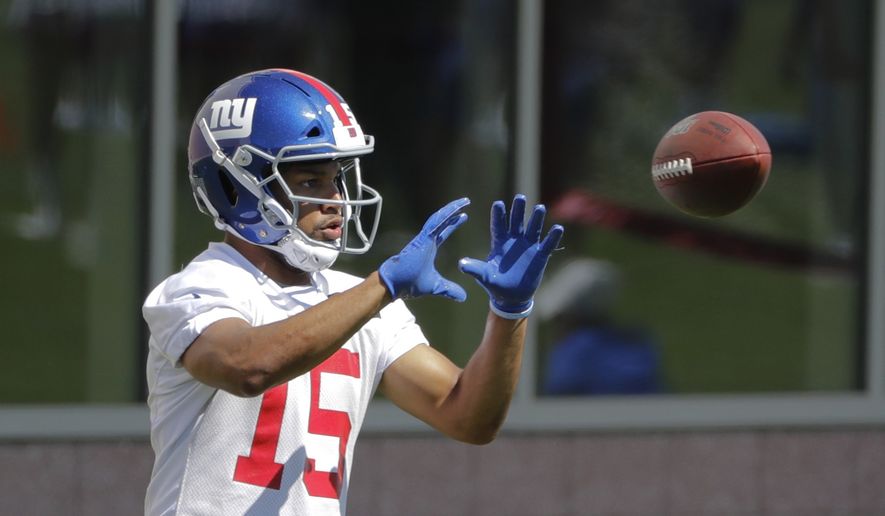Gut decisions make NFL suspensions murky

By DERON SNYDER (as published in The Washington Times)
At least drug tests are unambiguous, offering definitive pass/fail grades for the most part, either checking the box or not.
For instance, New York Giants receiver Golden Tate has been suspended four games for violating the NFL’s performance-enhancing substance policy. He blames his positive test on a fertility plan after he and his wife visited a specialist in April. “I started the treatment prescribed to me and just days later I discovered it contained an ingredient that is on the league’s banned substance list,” he said Saturday in a statement.
“I immediately discontinued use, I reported the situation to the Independent Administrator of the NFL Policy on Performance-Enhancing Substances, and I spoke with my coaches and general manager. I did all of this well before a failed test was even confirmed.”
Great. Sounds like he was very forthright after making an honest mistake … and he can bet on losing his appeal.
The league doesn’t care whether he hooked up an IV bag of steroids, or unknowingly ingested gummy bears laced with a banned drug. Former Indianapolis Colts linebacker Robert Mathis offered the same fertility-drug defense in 2014 and his four-game suspension was upheld.
Tate should’ve determined the contents before started the fertility plan, especially since similar treatments have led to a suspension. Players are responsible for whatever they ingest. The NFL doesn’t want to wade through explanations, tasked with separating veracity from duplicity. Family planning might be popular in lots of locker rooms under those circumstances.
Making suspensions for banned substances cut-and-dried is actually a reasonable position.
Conversely, the policy on suspensions for personal conduct makes less sense than playing Russian roulette.
Last week, the NFL suspended Seattle Seahawks defensive tackle Jarran Reed for six games, stemming from a 2017 incident that resulted in neither charges nor his arrest. His appeal was denied. “Of course I disagree with the decision, based on the facts …” Reed told reporters at Seahawks training camp. “The only thing we can do is move forward. I respect the NFL’s decision.”
It very well could be the right decision.
Police recommended a fourth-degree assault charge after Reed allegedly grabbed a woman “by the throat” and “dragged her down a couple of stairs.” But prosecutors cited insufficient evidence and declined to pursue the case. The NFL suspended Reed 27 months after the incident.
If that’s a case of being thorough, the decision on Kansas City Chiefs receiver Tyreek Hill must be reckless. Less than four months were necessary to determine a suspension wasn’t in order, following a criminal investigation into child abuse allegations.
“Based on the evidence presently available, the NFL cannot conclude that Mr. Hill violated the Personal Conduct Policy,” the league said in a statement ahead of training camp. “If further information becomes available through law enforcement, the pending court proceedings, or other sources, we will promptly consider it and take all appropriate steps at that time.”
Good luck trying to decode commissioner Roger Goodell’s definition of “appropriate steps.”
Hill, a two-time Pro Bowler and arguably the NFL’s most electrifying player, was a prime candidate for suspension, even though – like Reed – he wasn’t charged or arrested. Working against Hill was a threatening conversation that his son’s mother, Crystal Espinal, surreptitiously recorded in April, and a 2015 guilty plea on domestic violence against Espinal (while she was pregnant).
Adjudicating cases that don’t include formal charges is messy. But prior history is supposed to be a factor and Hill’s apparently was overlooked.
“I think all of us can learn something from that situation,” Hill told reporters Saturday, referencing the secret recording, He said he couldn’t address specifics regarding the child abuse case. “I’m just here to man up to what I did,” he said. “All I’m gonna say is I’ve just got to work on my life skills.”
And Goodell needs to work on his decision-making skills.
The commissioner has been as consistent as a malfunctioning metronome. He gave Hill a pass while previously suspending other players like Baltimore’s Jimmy Smith (four games) and Dallas’ Ezekiel Elliott (six games) who avoided penalties from the legal system.
Again, it’s possible that Elliott, Smith and Reed deserved to be suspended, regardless of what police and prosecutors decided. There’s a big difference between “not guilty” and “innocent.”
We just can’t trust Goodell with that distinction. That’s why a player like Tate should be thankful for the policy on banned substances.
Otherwise, he could’ve tested clean and Goodell’s gut would’ve suspended him anyway.
— Brooklyn-born and Howard-educated, Deron Snyder writes his award-winning column for The Washington Times on Tuesdays and Thursdays. Follow him on Twitter @DeronSnyder.
 Follow
Follow
